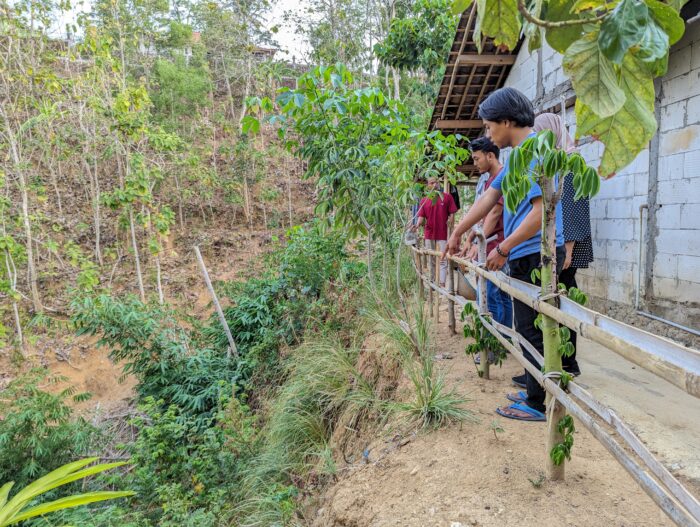PHOTO: Lorenzo Fellycyana/YEU. The youth group Karang Taruna Prima Gadung initiated a tree-planting project called Javanese Bamboo Sewing Earth, drawing inspiration from traditional tree-planting practices. This innovative approach will not only fortify the soil and mitigate landslides, but also bolster the local economy by cultivating economically valuable and sustainable horticultural plants.
By Jessica Novia
YAKKUM Emergency Unit (YEU) supports over 50 women’s and community groups in Yogyakarta, Indonesia, where we help develop community insight and responses to the profound impact of a changing climate.
In these vulnerable regions, rapid-onset disasters include floods, landslides, and strong winds that cause significant damage. Repairs to a family’s home can cost the same as or more than the income from their harvest. Such devastation also affects their mental health. A survey of 34 women’s communities in the Gunungkidul region of Yogyakarta revealed that some experienced PTSD, anxiety, depression, and even suicide as a result of loss and damage. Water scarcity is also a significant threat, made worse by the unremediated environmental impacts of previous development projects.
Community resilience clear
COP28, the annual global climate conference, has left us reflecting on the urgency of addressing climate change impacts felt by grassroots communities. There is also a need to acknowledge their many resilience efforts. While discussions and commitments at the global level are crucial, we must not lose sight of local efforts. Robust global regulations could ensure recognition of community-based resilience and provide sustained, accessible funding for them.
In Gunungkidul, the resilience of local communities is clear. In one community, a group of young people initiated a tree planting project called Javanese Bamboo Sewing Earth, drawing inspiration from traditional tree-planting practices. The trees will strengthen and bind the soil, mitigating against landslides. This innovative approach will fortify the soil and bolster the local economy by cultivating economically valuable and sustainable horticultural plants. The young people further preserve their culture by using native trees that are disappearing from the area, and use this Indigenous knowledge to defend against climate threats.
Elsewhere in the region, farmer groups have developed mist irrigation which conserves water and offers easier access to farmers with mobility challenges. Despite this, their crops may fail due to El Niño, which is expected to cause the first drought in the area. Another example of innovative resilience comes from women’s groups such as the Melati Women Farmers’ Group. Facing ongoing drought, these groups secure their families’ livelihoods by managing water, animal feed, and their rice fields. They also use waste to produce organic fertilizer and manage plastic waste. These activities have allowed them to generate additional income during the dry season and to mitigate the risk of floods in the rainy season.
Women’s groups’ unique insights
Women’s groups often have unique insights into potential disasters, understanding the local context and the specific challenges they face. By including the voices of their representatives, COP meetings could ensure that policies and decisions address communities’ real concerns. Gender justice must be at the forefront, acknowledging how women are often disproportionately affected by climate change. Their perspectives offer valuable insights into building resilient communities and sustainable solutions. Amplifying local voices, particularly those of women, is not just a matter of justice but a practical necessity for creating effective and inclusive climate policies.
Developing inclusive and effective approaches
Community-driven initiatives need direct and accessible funding. Decisions made at global COPs should prioritise the voices of grassroots communities as they grapple with the urgent impacts of the climate crisis. Regulations governing the use of loss and damage funds should ensure easy access for community-based initiatives. Support for capacity strengthening and accountable monitoring should be part of effective implementation.
A more inclusive and effective approach would include the following steps:
- communicate climate disaster contexts in simplified, local languages for community understanding;
- develop partnerships with local organizations that collaborate with communities to leverage insights for effective climate resilience strategies;
- formalise grassroots women’s leadership in public decision-making structures;
- channel financial investments to grassroots organisations to build their knowledge, skills, and leadership capacities;
- prioritise partnerships with grassroots organizations to ensure their access to funding and decisions that are aligned with community priorities.
A resilient and just future
Climate conference decisions must amplify the voices and experiences of communities on the frontline directly affected by climate-induced disasters. Global leaders should ensure that funds allocated for loss and damage, along with efforts toward gender justice, directly benefit society. COP meetings should transition from theoretical discussions to pragmatic solutions grounded in the realities of the most vulnerable communities.
Local communities, especially women, play a crucial role in identifying and dealing with potential disasters caused by climate change. With a community-centred lens, we can pave the way for a more resilient and just future.
Jessica Novia attended COP28 as an ACT delegate in December 2023. Her work with ACT member YAKKUM Emergency Unit (YEU) includes strengthening the capacities of at-risk groups, people with disabilities, women and older people with community-led disaster preparedness and humanitarian response. She is also a young representative of YEU’s climate focal point, striving to increase accessibility, accountability, and inclusion in her work.
Photo: The youth group Karang Taruna Prima Gadung initiated a tree-planting project called Javanese Bamboo Sewing Earth, drawing inspiration from traditional tree-planting practices. This innovative approach will not only fortify the soil and mitigate landslides, but also bolster the local economy by cultivating economically valuable and sustainable horticultural plants.
PHOTO: Lorenzo Fellycyana/YEU
